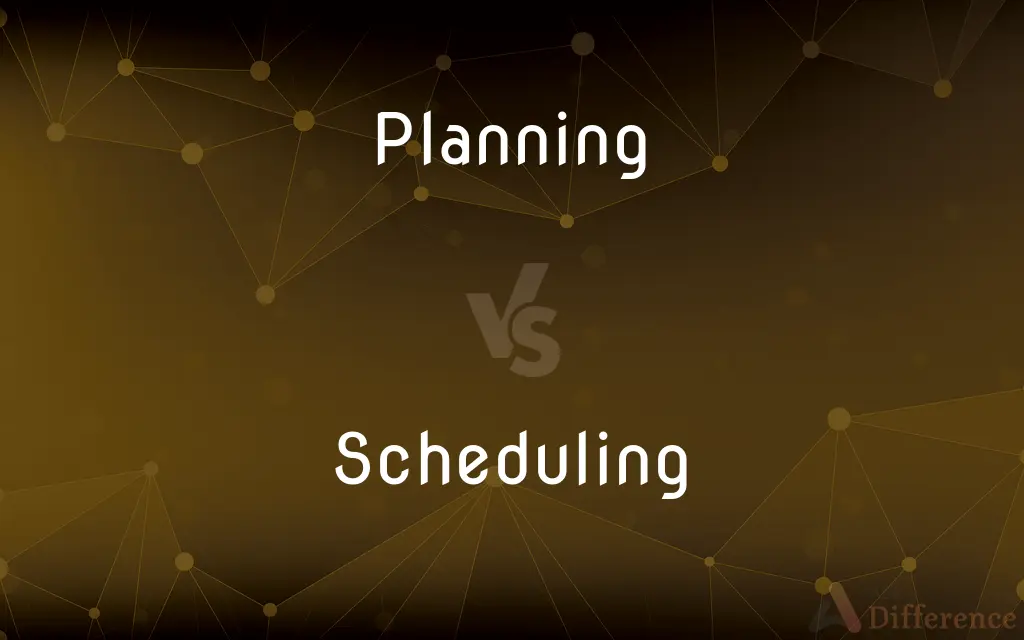Planning vs. Scheduling — What's the Difference?
Edited by Tayyaba Rehman — By Fiza Rafique — Updated on September 25, 2023
Planning involves setting goals and determining ways to achieve them. Scheduling assigns specific times to activities or tasks. Both are essential for effective time management but differ in scope and focus.

Difference Between Planning and Scheduling
Table of Contents
ADVERTISEMENT
Key Differences
Planning is a strategic activity that involves setting objectives, determining resources, and deciding the relevant strategies to attain goals. It provides a blueprint for future activities, highlighting what needs to be achieved. Scheduling, on the other hand, is a time-management tool, pinpointing when and where tasks will take place. While planning provides the "what" and "why," scheduling gives the "when" and "where."
In a business context, planning often deals with long-term goals, objectives, and strategies to position a company in its desired market space. It’s about vision, mission, and the overarching strategy. On the flip side, scheduling deals with the allocation of resources, be it human or material, to specific tasks over a timeline. So, while planning is about setting the direction, scheduling is about ensuring the resources are available at the right times to implement that direction.
In personal life, planning might involve setting life goals, such as career advancement or personal growth objectives. It's the act of thinking about and organizing the activities required to achieve a desired goal. Scheduling would then be the act of deciding when you'll work on these goals, like allocating specific hours in a week to attend a class or workshop. Therefore, while planning focuses on the bigger picture, scheduling zooms in on the specifics.
Comparison Chart
Definition
Strategic activity to set objectives.
Time-management tool for tasks.
Focus
Goals, objectives, strategies.
Timelines, resource allocation.
ADVERTISEMENT
Time Orientation
Can be long-term or short-term.
Typically more short-term and specific.
Associated Activities
Decision-making, strategizing, organizing.
Allocating, timing, sequencing.
Example in Sentence
"Planning is essential for a company's growth."
"Effective scheduling ensures timely project completion."
Compare with Definitions
Planning
The arrangement and organization of tasks or resources.
Planning ahead can prevent many potential problems.
Scheduling
Arranging a plan or timetable for activities or events.
Scheduling regular breaks can improve productivity.
Planning
The act of formulating a scheme or program.
Urban planning focuses on developing infrastructure for cities.
Scheduling
Setting up predetermined times for specific activities.
Scheduling appointments helps manage a busy day efficiently.
Planning
The process of making plans for something.
Proper planning ensures success in any venture.
Scheduling
The act of designating a date and time for an event or task.
Scheduling regular maintenance extends the life of equipment.
Planning
Determining a strategy to achieve a set goal.
Strategic planning is crucial for long-term business objectives.
Scheduling
Allocating resources or tasks to specific times.
Proper scheduling prevents resource conflicts in businesses.
Planning
Thinking about and organizing activities required for a desired outcome.
Career planning helps individuals focus on their professional aspirations.
Scheduling
A list of times of departures and arrivals; a timetable
A bus schedule.
A schedule of guided tours.
Planning
Planning is the process of thinking about the activities required to achieve a desired goal. It is the first and foremost activity to achieve desired results.
Scheduling
A plan for performing work or achieving an objective, specifying the order and allotted time for each part
Finished the project on schedule.
Planning
The process of making plans for something
The planning stages of the operation
Mass production methods call for detailed planning
Scheduling
A printed or written list of items in tabular form
A schedule of postal rates.
Planning
An orderly or step-by-step conception or proposal for accomplishing an objective
A plan for improving math instruction.
Scheduling
A program of events or appointments expected in a given time
Can you fit me into your schedule Tuesday afternoon?.
Planning
A proposed or intended course of action
Had no plans for the evening.
Scheduling
A student's program of classes.
Planning
A systematic arrangement of elements or important parts; a configuration or outline
A seating plan.
The plan of a story.
Scheduling
A supplemental statement of details appended to a document.
Planning
A drawing or diagram made to scale showing the structure or arrangement of something.
Scheduling
A federally regulated list of controlled substances, ranked in classes by potential for abuse.
Planning
In perspective rendering, one of several imaginary planes perpendicular to the line of vision between the viewer and the object being depicted.
Scheduling
One of the ranks or classes in such a list.
Planning
A program or policy stipulating a service or benefit
A pension plan.
Scheduling
To enter on a schedule
Calculate and schedule each tax deduction on the proper form.
Planning
To formulate a scheme or program for the accomplishment, enactment, or attainment of
Plan a campaign.
Scheduling
To make up a schedule for
I haven't scheduled the coming week yet.
Planning
To have as a specific aim or purpose; intend
They plan to buy a house.
Scheduling
To plan or appoint for a certain time or date
Scheduled a trip in June.
Was scheduled to arrive Monday.
Planning
To draw or make a graphic representation of.
Scheduling
To list or rank (a controlled substance) in a schedule.
Planning
To make plans.
Scheduling
Present participle of schedule
Planning
Present participle of plan
Scheduling
(uncountable) A function in many aspects of industry, commerce and computing in which events are timed to take place at the most opportune time.
Planning
(uncountable) Action of the verb to plan.
Scheduling
(countable) The time at which a particular event is scheduled.
Planning
The act of formulating of a course of action, or of drawing up plans.
Scheduling
(countable) Assignment to a schedule, or systematic arrangement.
Planning
The act of making contingency plans.
Scheduling
Setting an order and time for planned events
Planning
Planning permission.
My neighbours were going to build an extension but they didn't get planning.
Scheduling
Organizing events in a sequence or timetable.
TV networks spend a lot of time scheduling their programming.
Planning
An act of formulating a program for a definite course of action;
The planning was more fun than the trip itself
Planning
The act or process of drawing up plans or layouts for some project or enterprise
Planning
The cognitive process of thinking about what you will do in the event of something happening;
His planning for retirement was hindered by several uncertainties
Common Curiosities
What tools are commonly used for scheduling?
Common tools for scheduling include calendars, Gantt charts, and software like Microsoft Project.
How does planning differ from strategizing?
While both involve setting objectives, planning is more about organizing activities to reach a goal, whereas strategizing focuses on the broader approach to achieve those goals.
Does planning always guarantee success?
While planning increases the likelihood of success, it doesn't guarantee it due to unpredictable variables.
What's the relationship between planning and forecasting?
Forecasting predicts future trends or events, while planning prepares for these predictions.
Can planning be done without scheduling?
Yes, planning can be done without scheduling, but for effective implementation, scheduling is often crucial.
How detailed should scheduling be?
The detail in scheduling depends on the complexity of the task. For intricate projects, more detailed scheduling is beneficial.
Can scheduling be flexible?
Yes, scheduling can be flexible, adjusting to changes or unforeseen events as needed.
What is the main goal of planning?
The main goal of planning is to set objectives and determine ways to achieve them.
Why is scheduling important in project management?
Scheduling ensures that project tasks are completed in a timely manner and resources are allocated efficiently.
Is scheduling only about time management?
Primarily, scheduling is about time management, but it also involves resource allocation and sequencing of tasks.
What is the significance of contingency planning?
Contingency planning prepares for potential challenges or changes, ensuring smoother operation despite disruptions.
How does scheduling relate to deadlines?
Scheduling sets specific timelines for tasks, helping ensure that deadlines are met.
Can planning and scheduling be automated?
Yes, with modern software tools, many aspects of planning and scheduling can be automated for efficiency.
How does planning help in resource management?
Planning determines what resources are needed, ensuring they're used effectively and efficiently.
Why might scheduling need to be revised?
Scheduling might need revision due to changes in resource availability, unexpected delays, or shifts in priorities.
Share Your Discovery

Previous Comparison
Reverend vs. Venerable
Next Comparison
Null vs. HAuthor Spotlight
Written by
Fiza RafiqueFiza Rafique is a skilled content writer at AskDifference.com, where she meticulously refines and enhances written pieces. Drawing from her vast editorial expertise, Fiza ensures clarity, accuracy, and precision in every article. Passionate about language, she continually seeks to elevate the quality of content for readers worldwide.
Edited by
Tayyaba RehmanTayyaba Rehman is a distinguished writer, currently serving as a primary contributor to askdifference.com. As a researcher in semantics and etymology, Tayyaba's passion for the complexity of languages and their distinctions has found a perfect home on the platform. Tayyaba delves into the intricacies of language, distinguishing between commonly confused words and phrases, thereby providing clarity for readers worldwide.
















































